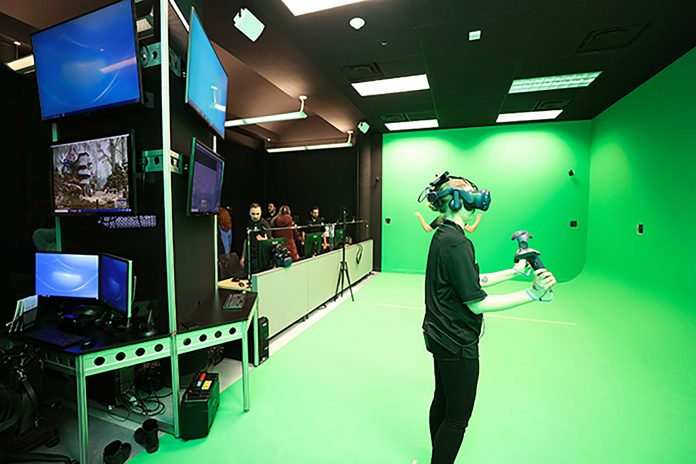Durham College stepped into the virtual world with its Mixed Reality Capture studio (MRC) just before the start of the pandemic. Now it hopes to really ramp up the studio as people return to campus.
The idea for the studio, located on the Oshawa campus, came from John Goodwin, program coordinator of the Game Art program, a few years ago.
“We were looking into pushing into VR (virtual reality) work as an extension of the work that we do in the Game Art program,” he said.
The studio contains a state-of-the-art motion capture stage, virtual tracking equipment, and a green screen.
It offers students and organizations the chance to work with mixed reality, the marriage of two technologies: virtual reality (VR) and augmented reality (AR).
VR is a computer-generated simulation of a 3D environment that a person can interact with physically. AR involves a computer-generated image being overlaid onto a view of the real world, usually through a smartphone.
MRC opportunities for students
The MRC studio works with small to medium-sized businesses and startups to develop ideas related to motion capture and mixed reality, such as video game development and training simulations.
When businesses work with the MRC studio, Durham College students are part of the deal. Two to four students from the Game Art program work on projects in paid positions.
“They can get real-life world experience on real-world projects before they even graduate,” said Goodwin.
The students work alongside faculty members and directly with the college’s business partners as mentors.
“It’s a great opportunity for students to do work between classes on a project that deep dives into an area of interest, while getting paid,” Goodwin said. “That was really important to us and it’s a cornerstone of what the MRC studio is.”
MRC in demand
One of the current projects involves a training simulation for firefighters. The project aims to train them for many different scenarios, including a ceiling collapse.
“What we’re suggesting is that there may be a way to train them for those situations where they wouldn’t get hurt,” said Goodwin.
The simulation uses a VR headset as well as motion capture suits to track the firefighters’ movements. Every movement a trainee makes can be recorded and played back to them help them view and correct mistakes.
Another recently completed project involved a company called Farm Ventures. The company built a VR game called “Catch Driver VR.” The game lets its users control a horse with two reins. The MRC studio was tasked with building the physical controllers.
When it comes to careers, the MRC studio’s principal researcher, Ryan Miller, said most jobs are in video game development.
“VR is really just game development with a fancy monitor,” he said.
These jobs include graphics programmers, game designers, game artists, and animators.
Future of AR/VR
However, Miller is concerned about the power the company Meta, formerly known as Facebook, has over the industry.
“All the competition is kind of being squeezed right now,” he said.
According to Miller, when Meta bought the biggest producer of VR headsets, Oculus, they were able to take control of the industry. Now users must have a Facebook account to use an Oculus headset.
“A lot of uses we’ve seen pitched for the Metaverse right now are honestly really uninspiring,” he said.
He said pitches like a virtual Walmart store are no different than older video games such as Sims and Second Life, which allow users to control avatars in a virtual world.Players can buy clothes, own houses and form relationships, similar to the concept of the Metaverse.
“These are all things we had ten to 20 years ago,” he said.
He and Goodwin expect the MRC to evolve that technology.
Goodwin says the future of the industry is merging VR with other types of technology such as AR and motion capture.
“This is really what the MRC is all about, looking at the convergence of these technologies,” he said. “When all of those technologies are mashed together in a novel and interesting way, you end up with something which is extremely disruptive.”




